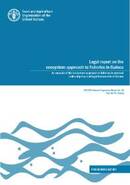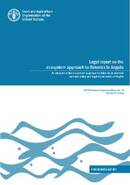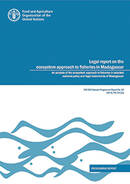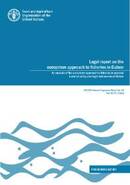EAF-Nansen Programme reports

Legislating for the ecosystem approach to fisheries (EAF) is complex, due to the holistic nature of the EAF involving multiple factors that underpin the social, economic, environmental, and institutional aspects of fisheries sustainability. These factors include ecosystems integration, risks, inter-sectoral collaboration, research, participatory processes, monitoring, control, surveillance, and enforcement, among others. To assess how the EAF is being implemented through national policy and legal frameworks, FAO developed A diagnostic tool for implementing an ecosystem approach to fisheries through national policy and legal frameworks.
The present legal report on the EAF used the diagnostic tool to assess the alignment of selected policy and legal instruments of Guinea with the EAF. This assessment analysed the extent to which 82 EAF legal requirements, which are considered the minimum standards in legislating for the EAF, are reflected in Guinea's policies and legislation relevant to the fisheries sector of the country and other relevant sectors (such as environment, wildlife, ecosystems, and maritime affairs). Based on this preliminary diagnosis, gaps were identified in the assessed instruments, and recommendations were made for improving the implementation of the EAF.
This report was elaborated following a participatory approach with the involvement of the national competent authorities of Guinea. Drafted in July 2021, the report was submitted to the national authorities of Guinea in October 2021. The Centre National des Sciences Halieutiques de Boussoura (CNSHB) [National Centre of Fisheries Sciences of Boussoura] endorsed this EAF Legal Report of Guinea in July 2022.

Legislating for the ecosystem approach to fisheries (EAF) is complex, due to the holistic nature of the EAF involving multiple factors that underpin the social, economic, environmental, and institutional aspects of fisheries sustainability. These factors include ecosystems integration, risks, inter-sectoral collaboration, research, participatory processes, monitoring, control, surveillance, and enforcement, among others. To assess how the EAF is being implemented through national policy and legal frameworks, FAO developed A diagnostic tool for implementing an ecosystem approach to fisheries through national policy and legal frameworks.
The present legal report on the EAF used the diagnostic tool to assess the alignment of selected policy and legal instruments of Guinea-Bissau with the EAF. This assessment analysed the extent to which 82 EAF legal requirements, which are considered the minimum standards in legislating for the EAF, are reflected in Guinea-Bissau's policies and legislation relevant to the fisheries sector of the country and other relevant sectors (such as environment, wildlife, ecosystems, and maritime affairs). Based on this preliminary diagnosis, gaps were identified in the assessed instruments, and recommendations were made for improving the implementation of the EAF
This report was elaborated following a participatory approach with the involvement of the national competent authorities of Guinea-Bissau. Drafted in July 2021, the report was submitted to the national authorities of Guinea-Bissau in October 2021. The Ministry of Fisheries, through its Secretary-General and Legal Office, endorsed this EAF Legal Report of Guinea-Bissau in July 2022.

The present legal report on the EAF used the diagnostic tool to assess the alignment of selected policy and legal instruments of Angola with the EAF. This assessment analysed the extent to which 82 EAF legal requirements are reflected in Angola' policies and legislation relevant to the country’s fisheries sector and other sectors that interact with fisheries (such as environment, wildlife and ecosystems, maritime). Based on this preliminary diagnosis, gaps were identified in the assessed instruments, and recommendations on specific areas that need further improvement.
Legislating for an ecosystem approach to fisheries (EAF) is complex, due to the holistic nature of EAF involving multiple factors that underpin the social, economic, environmental, and institutional aspects of fisheries sustainability. These factors include ecosystems integration, risks, inter-sectoral collaboration, research, participatory processes, monitoring, control, surveillance, and enforcement, among others. To assess how the EAF is being implemented through national policy and legal frameworks, FAO developed A diagnostic tool for implementing an ecosystem approach to fisheries through national policy and legal frameworks.
This report was elaborated following a participatory approach with the involvement of the national competent authorities of Angola. Drafted in July 2021, the report was submitted to the national authorities of Angola in October 2021. The Ministry of Agriculture and Fisheries of Angola endorsed this EAF Legal Report of Angola in June 2022.

Legislating for an ecosystem approach to fisheries (EAF) is complex, due to the holistic nature of EAF involving multiple factors that underpin the social, economic, environmental, and institutional aspects of fisheries sustainability. These factors include ecosystems integration, risks, inter-sectoral collaboration, research, participatory processes, monitoring, control, surveillance, and enforcement, among others. To assess how an EAF is being implemented through national policy and legal frameworks, FAO developed A diagnostic tool for implementing an ecosystem approach to fisheries through national policy and legal frameworks.
The present legal report on the EAF used the diagnostic tool to assess the alignment of selected policy and legal instruments of Madagascar with an EAF. This assessment analysed the extent to which 82 EAF legal requirements, which are considered the minimum standards in legislating for an EAF, are reflected in Madagascar's policies and legislation relevant to the fisheries sector of the country and other relevant sectors (such as environment, wildlife, ecosystems, and maritime affairs). Based on this preliminary diagnosis, gaps were identified in the assessed instruments, and recommendations were made for improving the implementation of an EAF.
This report was elaborated following a participatory approach with the involvement of the national competent authorities of Madagascar. Drafted in July 2021, the report was submitted to the national authorities of Madagascar in October 2021. The Ministry of Fishery and Blue Economy endorsed this EAF Legal Report of Madagascar in May 2022.

Legislating for an ecosystem approach to fisheries (EAF) is complex, due to the holistic nature of EAF involving multiple factors that underpin the social, economic, environmental, and institutional aspects of fisheries sustainability. These factors include ecosystems integration, risks, inter-sectoral collaboration, research, participatory processes, monitoring, control, surveillance, and enforcement, among others. To assess how an EAF is being implemented through national policy and legal frameworks, FAO developed A diagnostic tool for implementing an ecosystem approach to fisheries through national policy and legal frameworks.
The present legal report on the EAF used the diagnostic tool to assess the alignment of selected policy and legal instruments of Gabon with an EAF. This assessment analysed the extent to which 82 EAF legal requirements, which are considered the minimum standards in legislating for an EAF, are reflected in Gabon's policies and legislation relevant to the fisheries sector of the country and other relevant sectors (such as environment, wildlife, ecosystems, and maritime affairs). Based on this preliminary diagnosis, gaps were identified in the assessed instruments, and recommendations were made for improving the implementation of an EAF.
This report was elaborated following a participatory approach with the involvement of the national competent authorities of Gabon. Drafted in July 2021, the report was submitted to the national authorities of Gabon in October 2021. The Ministry of Fisheries and Maritime Economy of Gabon endorsed this EAF Legal Report of Gabon in May 2022.
